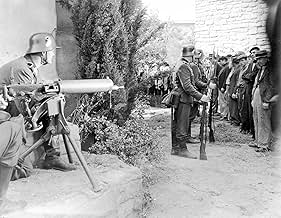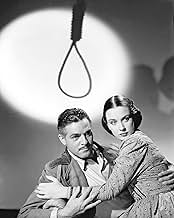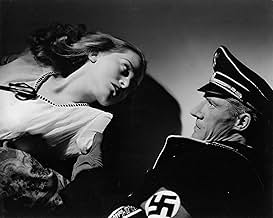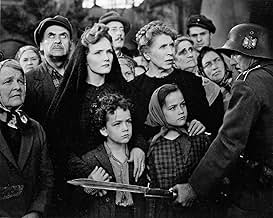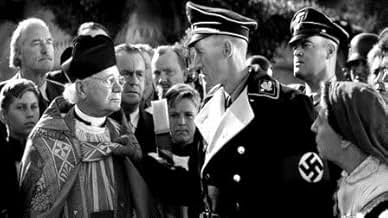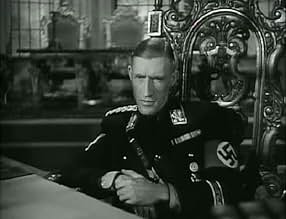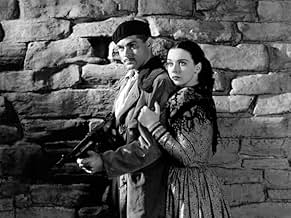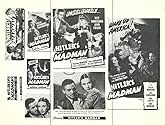Story of the assassination of Reinhard Heydrich, Nazi SS commander, by Czech partisans and the reprisals inflicted by the Nazis on the Czechs.Story of the assassination of Reinhard Heydrich, Nazi SS commander, by Czech partisans and the reprisals inflicted by the Nazis on the Czechs.Story of the assassination of Reinhard Heydrich, Nazi SS commander, by Czech partisans and the reprisals inflicted by the Nazis on the Czechs.
Ludwig Stössel
- Herman Bauer
- (as Ludwig Stossel)
Enrique Acosta
- Prisoner
- (uncredited)
Fred Aldrich
- German Machine Gunner
- (uncredited)
Nellie Anderson
- Old Lady Masaryk
- (uncredited)
Louis V. Arco
- German Sergeant
- (uncredited)
Richard Bailey
- Anton Bartonek
- (uncredited)
Wilmer Barnes
- Officer
- (uncredited)
Walter Bonn
- Military Doctor
- (uncredited)
Chet Brandenburg
- Linesman
- (uncredited)
Storyline
Did you know
- TriviaWhile in Germany before the war, director Douglas Sirk met Reinhard Heydrich at a party, and later recalled that "he made my blood run cold."
- GoofsHeydrich was ambushed in the city of Prague, not on a country road. His travel plans were also no secret: despite Hitler's admonitions Heydrich always took the same route when traveling in the city, believing the the people were too cowed to dare attack him.
- Quotes
[last lines]
Anton Bartonek: Telling you not to eat or drink. one morsel of food, one swallow of drink, before you think, Before you think! What is best for your country. Keep your country free from the foe you hate. Catch him! Catch him! Do not wait!
- ConnectionsFeatured in Imaginary Witness: Hollywood and the Holocaust (2004)
Featured review
Douglas Sirk's career is recalled for his wonderful colorful attacks on the "American Dream" in those films he made (usually with Rock Hudson, Jane Wyman, and Agnes Moorehead) in the 1950s. Never was the lusciousness of American prosperity used to show the underside of our wealth oriented culture. But Sirk had a long career in Europe and Hollywood before he made "Magnificent Obsession" and "Imitation of Life". His films in the middle forties included some superb costume films with George Sanders (like "Summer Storm")and this early one which really stars John Carridine as one of the most monstrous figures of World War II, Reinhard Heydrich the so-called "Protector" of Bohemia, who chaired the Wannsee Conference of 1941 that created the "Final Solution". Whatever degree of venom Carridine brings to the role is nothing like the effortless evil the original Heydrich dripped. Still it is a very effective performance.
The film is based, by the way, on the poem "Lidice" by Edna St. Vincent Millay. Written shortly after that village was decimated in the reprisals following Heydrich's death, it is recited (in a woman's voice) in most of the film, but it's closing lines are recited by the male actors at it's conclusion - quite effectively as most of these actors (Edgar Kennedy, Jimmy Conlon, Ralph Morgan) have been slaughtered by the Nazis in front of us. As some of these actors (Kennedy and Conlon) usually were seen in comedies, their use as straight dramatic actors in this film is a revelation of what they might have done if they had not been used in comedy so much.
To me the best moment of this film (aside the use of the poem) is when Carridine lies dying in a hospital, visited by Howard Freeman as his comrade and fellow S.S. bigwig, Heinrich Himmler. Freeman was an affective actor in comic and dramatic parts, and here shows the hideous Himmler as a banal Babbitt bureaucrat. Perhaps not quite correct historically (Himmler was stranger than George Babbitt) but in it's way quite effective. Carridine had (in his characterization) shown something of the intellectual pretensions of Heydrich, but as he is dying he suddenly realizes he is frightened of dying. He tries to explain this to Himmler who doesn't care (so much for being a fellow Nazi comrade) and only sees the mission of the dying Heydrich to become a martyr to stiffen German will to victory. As Carridine finally dies, Freeman only sees his duty to make a large enough retaliation on the local population so that people will realize that he is harder than the dead martyr ever was.
Historically this is not accurate either. Heydrich had been in high level Nazi planning for several years, and frightened not only Himmler as a rival, but Bormann, Goebbels, and Hitler himself. Heydrich had a nasty "rumor" in his past: his father, a musician, may have been descended from Jews. This was never settled. However, due to this particular rumor, Heydrich's opponents felt they could control him. In actuality, it was easier to control an out of control Mercendes Benz. As soon as he could, Heydrich began collecting information on every one of his rivals about their family backgrounds (including Hitler's). It was his eventual determination that he would one day be the successor of "Der Fuhrer". Himmler, Hitler, and the others may have officially honored Heydrich as a national martyr, but in their own private moments they all were fully glad to see that he was dead and out of the way.
Their real reason for the massive retaliation was the fear of copycat plans. The Czechs who killed Heydrich were trained in London, and had Churchill's assent on their plot. No doubt, had they gotten away with it, plots against other Nazi big-wigs would have been set in motion. The retaliation was to remind the local populations that the Germans would not hesitate to depopulate them if anymore assassinations occurred. It was also a reminder to the Allies that if they wanted to save lives they better not plan any further killings. As such it worked. Although several plans for an attack on Hitler were finally set up, none were ever put into operation (the 1944 bomb plot was by the German General staff, not by Churchill). Whether this was wise or not is a matter we cannot ever tell the answer to.
Heydrich's actual death is nothing like the hideous death camps he set up for Jews, Gypsies, Slavs. etc. But it still is somewhat pleasant to think of the agony of his last days, his spine broken by the steel springs of his exploded car seat. The affection that his title "Protector" supposedly suggested is truly shown by a story of how a German soldier desperately tried to get passers by to assist to help move the "Protector" to a nearby hospital quickly. An unknown Czech citizen looked at the dying man in the ruins of his Mercedes, shrugged his shoulders, and said, "The hospital is around the corner. He could walk there." Then he left the flustered soldier.
The film is based, by the way, on the poem "Lidice" by Edna St. Vincent Millay. Written shortly after that village was decimated in the reprisals following Heydrich's death, it is recited (in a woman's voice) in most of the film, but it's closing lines are recited by the male actors at it's conclusion - quite effectively as most of these actors (Edgar Kennedy, Jimmy Conlon, Ralph Morgan) have been slaughtered by the Nazis in front of us. As some of these actors (Kennedy and Conlon) usually were seen in comedies, their use as straight dramatic actors in this film is a revelation of what they might have done if they had not been used in comedy so much.
To me the best moment of this film (aside the use of the poem) is when Carridine lies dying in a hospital, visited by Howard Freeman as his comrade and fellow S.S. bigwig, Heinrich Himmler. Freeman was an affective actor in comic and dramatic parts, and here shows the hideous Himmler as a banal Babbitt bureaucrat. Perhaps not quite correct historically (Himmler was stranger than George Babbitt) but in it's way quite effective. Carridine had (in his characterization) shown something of the intellectual pretensions of Heydrich, but as he is dying he suddenly realizes he is frightened of dying. He tries to explain this to Himmler who doesn't care (so much for being a fellow Nazi comrade) and only sees the mission of the dying Heydrich to become a martyr to stiffen German will to victory. As Carridine finally dies, Freeman only sees his duty to make a large enough retaliation on the local population so that people will realize that he is harder than the dead martyr ever was.
Historically this is not accurate either. Heydrich had been in high level Nazi planning for several years, and frightened not only Himmler as a rival, but Bormann, Goebbels, and Hitler himself. Heydrich had a nasty "rumor" in his past: his father, a musician, may have been descended from Jews. This was never settled. However, due to this particular rumor, Heydrich's opponents felt they could control him. In actuality, it was easier to control an out of control Mercendes Benz. As soon as he could, Heydrich began collecting information on every one of his rivals about their family backgrounds (including Hitler's). It was his eventual determination that he would one day be the successor of "Der Fuhrer". Himmler, Hitler, and the others may have officially honored Heydrich as a national martyr, but in their own private moments they all were fully glad to see that he was dead and out of the way.
Their real reason for the massive retaliation was the fear of copycat plans. The Czechs who killed Heydrich were trained in London, and had Churchill's assent on their plot. No doubt, had they gotten away with it, plots against other Nazi big-wigs would have been set in motion. The retaliation was to remind the local populations that the Germans would not hesitate to depopulate them if anymore assassinations occurred. It was also a reminder to the Allies that if they wanted to save lives they better not plan any further killings. As such it worked. Although several plans for an attack on Hitler were finally set up, none were ever put into operation (the 1944 bomb plot was by the German General staff, not by Churchill). Whether this was wise or not is a matter we cannot ever tell the answer to.
Heydrich's actual death is nothing like the hideous death camps he set up for Jews, Gypsies, Slavs. etc. But it still is somewhat pleasant to think of the agony of his last days, his spine broken by the steel springs of his exploded car seat. The affection that his title "Protector" supposedly suggested is truly shown by a story of how a German soldier desperately tried to get passers by to assist to help move the "Protector" to a nearby hospital quickly. An unknown Czech citizen looked at the dying man in the ruins of his Mercedes, shrugged his shoulders, and said, "The hospital is around the corner. He could walk there." Then he left the flustered soldier.
- theowinthrop
- Feb 19, 2005
- Permalink
- How long is Hitler's Madman?Powered by Alexa
Details
- Release date
- Country of origin
- Languages
- Also known as
- Hitler's Hangman
- Filming locations
- Angeles Crest Highway, Angeles National Forest, California, USA(exterior snow scenes)
- Production companies
- See more company credits at IMDbPro
Box office
- Budget
- $300,000 (estimated)
- Runtime1 hour 24 minutes
- Color
- Aspect ratio
- 1.37 : 1
Contribute to this page
Suggest an edit or add missing content


